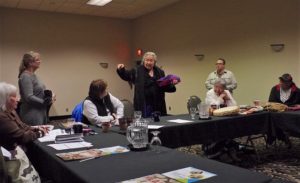Traditional approaches to healing and wellness focus of Health Transformation Engagement session

By Rick Garrick
THUNDER BAY—Long Lake #58 Elder Corrine Nabigon appreciated the opportunity to discuss the traditional approaches to healing and wellness at the Anishinabek Nation’s Health Transformation Engagement Session held on March 19-20 in Thunder Bay.
“We included the whole circle of life from youth to Elders,” Nabigon says. “We looked at it from the Seven Grandfather Teachings and our way of life and the sacred circle and how we are going to input that into the system.”
Nabigon adds that the participants also looked at the current medical system that is in place for community members.
“We said that we would have to continue with some of the medicines from the Western civilization because it has been introduced,” Nabigon says. “But we would like to ensure that it was under our direction, not their direction.”
The engagement session included a look at how other regions and First Nations have approached health transformation and the current health system and delivery to First Nations in Ontario.
“I don’t know if it’s so much a transformation we need to do,” says Northern Superior Elder Mike Esquega. “I think it’s just reorganizing our own health system the way that we want to see it instead of it being delivered by non-Native people. I’d rather call it our own health program, delivered for our people from our own people and following our own traditional ways of medicines and ceremonies and implementing that way with our knowledgeable Elders that practice that way.”
Jeannette Corbiere Lavell, commissioner on citizenship for the Anishinabek Nation, also delivered a presentation on Aging Without Violence during the engagement session.
“I’m at that stage of my life now where I have to think about what’s happening to other Elders in the community and looking at what we are leaving for our grandchildren and the future generations,” Corbiere Lavell says. “It was my intention to share some of the experiences and the good times—the good teachings I had with my Elders, my grandparents, my aunties—that I would like to leave with my grandchildren.”
Corbiere Lavell also brought up how some Elders feel lonely and are afraid to speak out in long-term care institutions.
“So maybe if we have our own health care delivery system, that won’t be there and it will change and they will feel more comfortable and then we will bring them into a part of the community again,” Corbiere Lavell says.
Cathy Bellefeuille, health transformation consultant with the Anishinabek Nation, says the community members provided plenty of input during the engagement session, which was held at the Victoria Inn.
“A lot of it was transportation, health care not being available in First Nations, accessibility issues, poverty issues, food security issues, housing, services just not being there for First Nations and having to travel to urban centres,” Bellefeuille says. “A lot of the members that are here are Elders, so they would really like to see the traditional medicines more available in health care.”
Bellefeuille previously held engagement sessions in Sudbury, London, Chippewas of Rama First Nation, Garden River and Ottawa since Jan. 31.
“Everybody has their own experience with health care, but everybody is saying the same thing — that there needs to be changes,” Bellefeuille says. “Nobody likes non-insured benefits, nobody likes to get second or third-rate health care. They want to be able to have their loved ones close to home, they want to be close to home when they are not well. They want to be able to get benefits that are equal to what the mainstream gets or better.”


